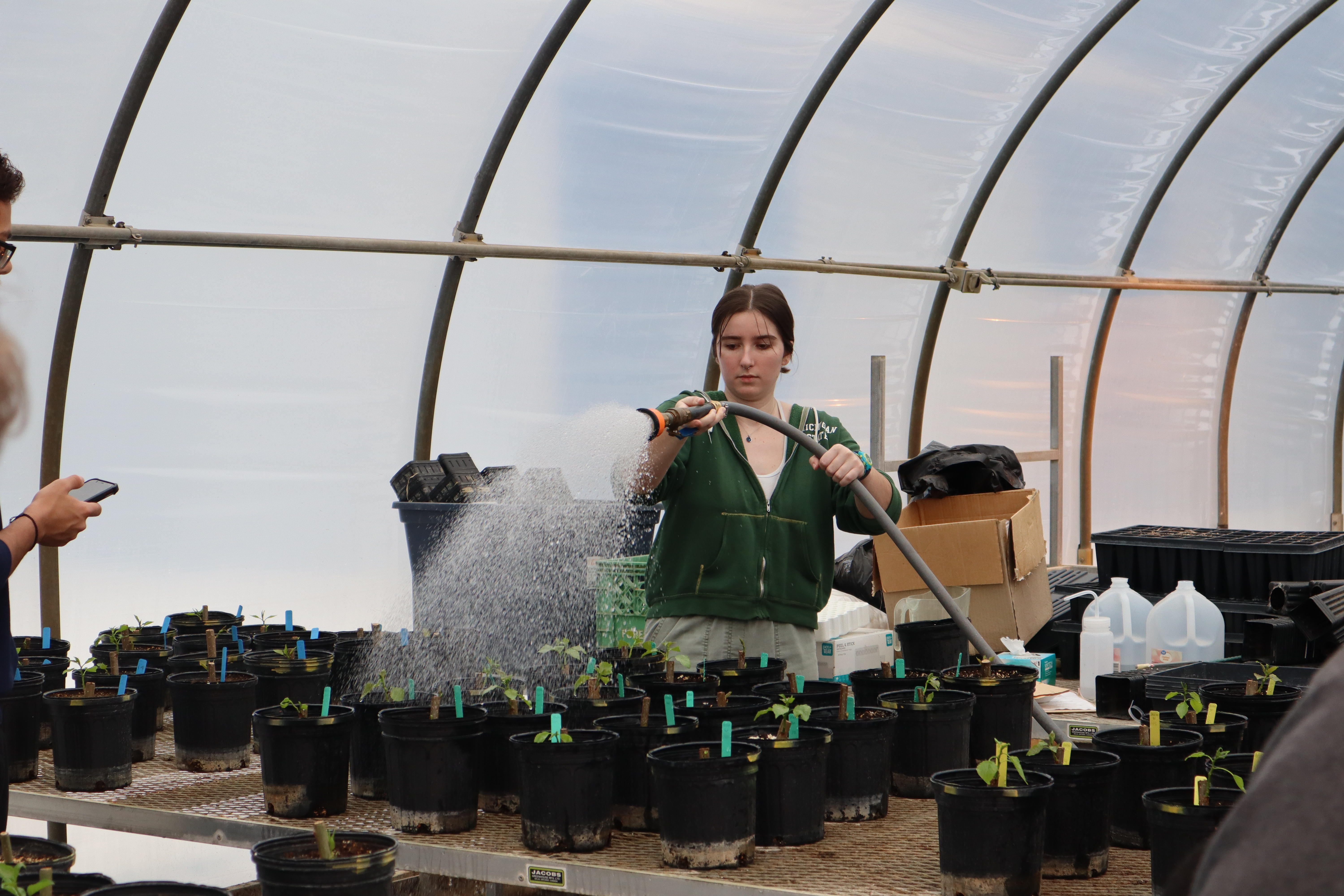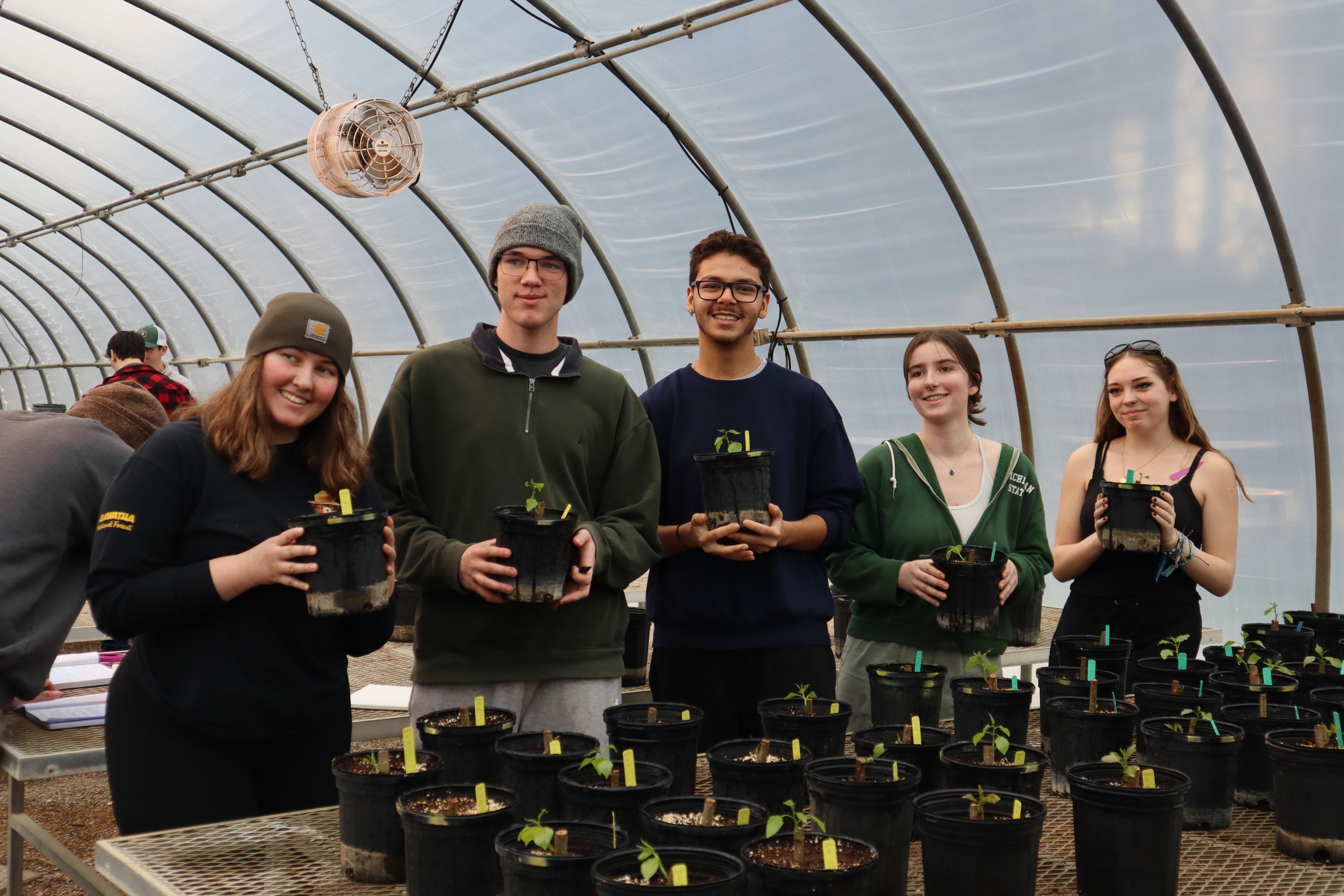FOR 175: Tree Biology
Dr. Jeremy Johnson’s new course on tree biology and forest genetics.

Jeremy Johnson has been at MSU in the Department of Forestry for two years and has been focused on developing new courses on tree biology and forest genetics. FOR 175 Tree Biology welcomed its first cohort of students during the Spring 2024 semester.
“My favorite part is the access to all the resources and all the brainpower that comes with working at a big institution like this, particularly in plant biology. From the facilities to the people, it’s been really exciting,” said Johnson.
Johnson explains that trees are unique in terms of how they grow, and this unique biology isn’t fully captured in existing plant biology courses currently offered.
This was how he came to develop a brand new course for students to gain a well-rounded understanding of the different factors that affect how trees grow while also being hands-on.
For this introductory course, Johnson’s approach was to structure the curriculum so that early on in the undergraduate program, students can develop a more complete biological understanding of tree structures and functions prior to taking classes like FOR 340 Forest Ecology.
“In class we have lectures where we talk about cells, genetics, morphology and the physiology of trees. When we go into the lab, the students are involved in every aspect of designing their experiments,” said Johnson.
The lab portion of the class, taking place at the Tree Research Center, just south of campus, has allowed the students to explore and demonstrate what they are learning in classroom lectures. They learn how to set up a laboratory notebook as well as learn the appropriate practices for keeping track of observations and recording data. Then, students work on hypothesis generation and basic statistics, helping to build up these skills needed for their semester-long experiment.
“The first lab was about propagating the trees, so we planted over 300 hybrid poplars from two different genotypes. From then, they had to devise an experiment that tested something about tree biology,” said Johnson.

Each lab group was free to choose what they were most interested in testing about their new saplings that they will be monitoring throughout the semester. That could be the role of shade, water, or nutrients, amongst other factors. Throughout the semester, students are responsible for recording their sapling’s progress, sharpening the practical and methodical skills that Johnson’s course is all about.
“The way this course’s lab is integrated with the lecture has grown my tree biology knowledge in a way that is shockingly obvious when I read my early lab notebook entries compared to today. I especially enjoy learning the fundamentals of tree biology and immediately applying that knowledge to our Hybrid Poplar clone experiments,” said Dustin Lambries, a student in Johnson’s class.
Lambries is early on in the undergraduate program and feels as though taking this course was the right choice.
“I am thankful that I was able to take this class at an early point in the forestry program. It has opened my eyes to the research side of Natural Resources and meshes very well with other first-year forestry classes. The broader understanding provided by this class will surely come in handy as I continue my forestry path,” said Lambries.
Experiential learning is pertinent to not only this course, but most other courses in the forestry program as well.
“I think that’s one of the reasons we’re all in forestry, right? We love trees and forests and being outside. You can only go so far sitting in a classroom. Giving students that break to then go out and actually do those things that they are learning about, I think it helps to incorporate that into their understanding of reality. Without that, sometimes it just becomes rote memorization, and it’s difficult to apply that when you need to,” said Johnson.
The course has been well received so far, and Johnson has really enjoyed the curiosity and enthusiasm from his students. FOR 175 has cultivated a rich learning environment that goes both ways between the students and the professor.
“My experience with the course has been very positive. Dr. Johnson is engaging in his lectures because you can feel the passion he has for the subject. Recently, I asked him a question about photosynthesis. He not only answered it but went above and beyond in making sure I understood why it was the case so that I could succeed. Before every exam, he will help us shake off our nerves by asking us to stand up to stretch if we need to and tell cheesy jokes,” said Leah Boocher, another student in FOR 175.

People like Johnson make MSU a great place to learn and explore a new field of study, and Johnson feels the same way about the students.
“I’ve taught in a lot of other places in different states and institutions, and the students in this department are pretty phenomenal. They all show up, they’re always energetic and asking great questions, and that makes the whole class easier in a lot of ways because it feels like I’m getting across to them. It makes it all the more exciting to teach this type of class,” said Johnson.



 Print
Print Email
Email





